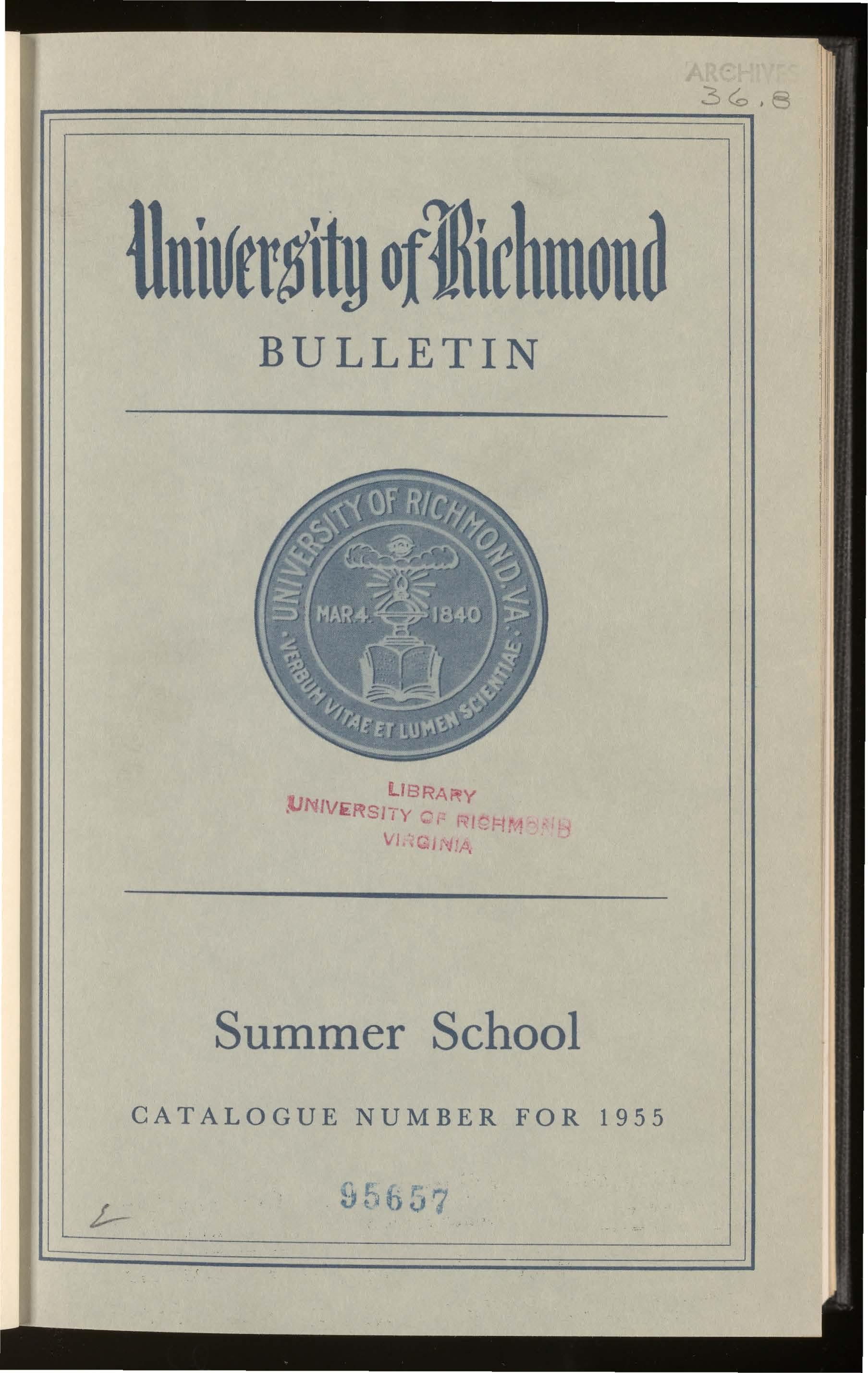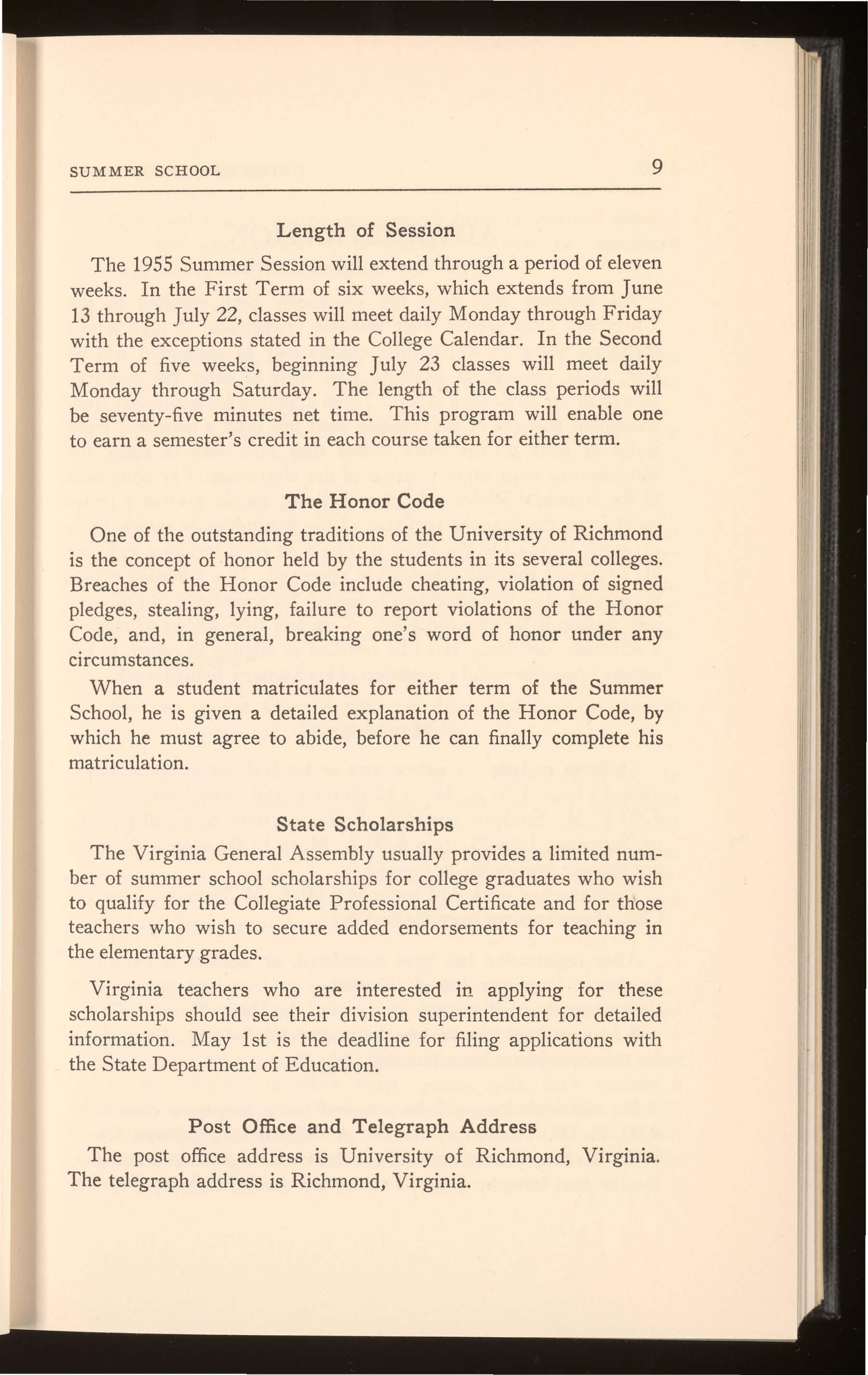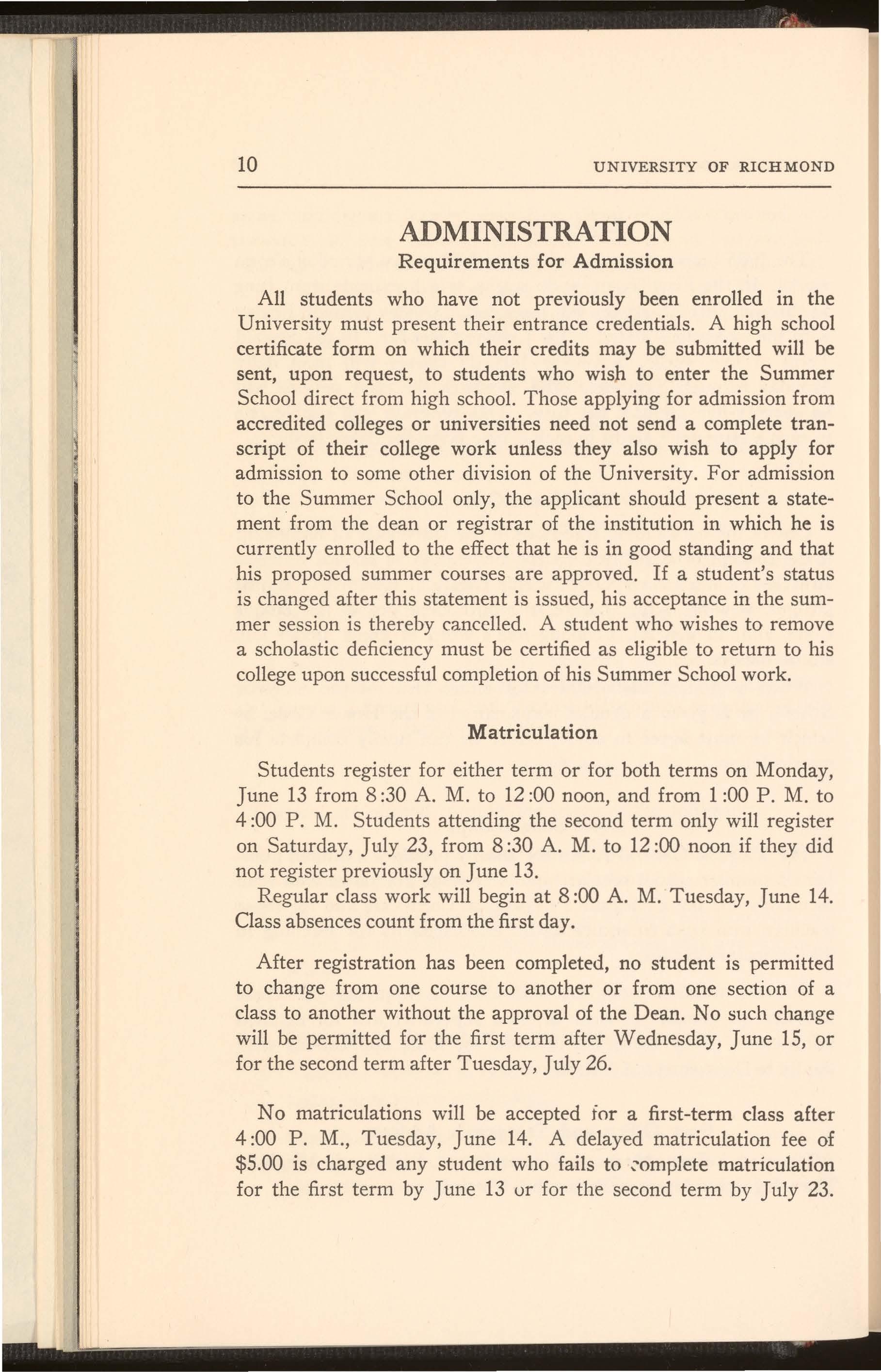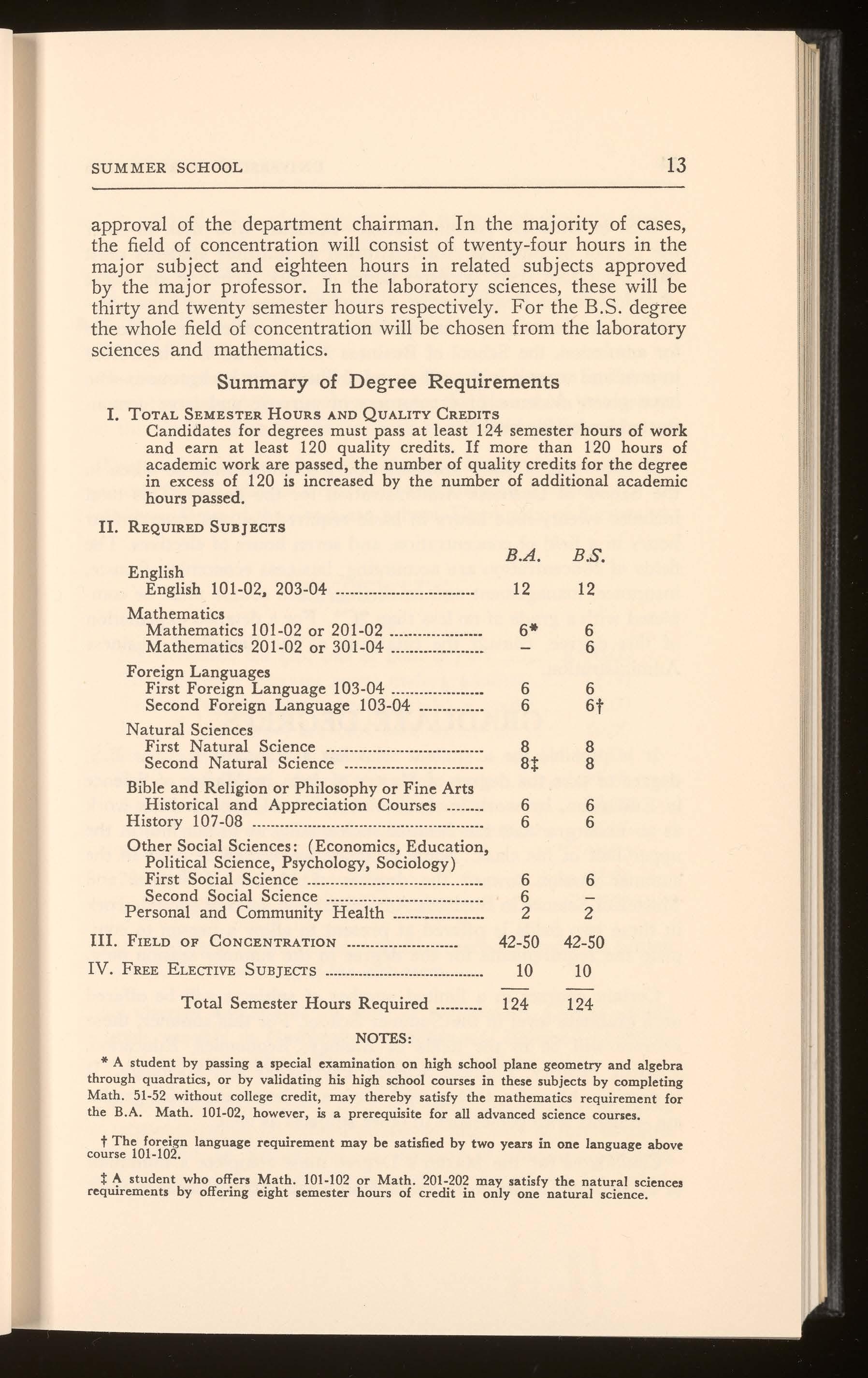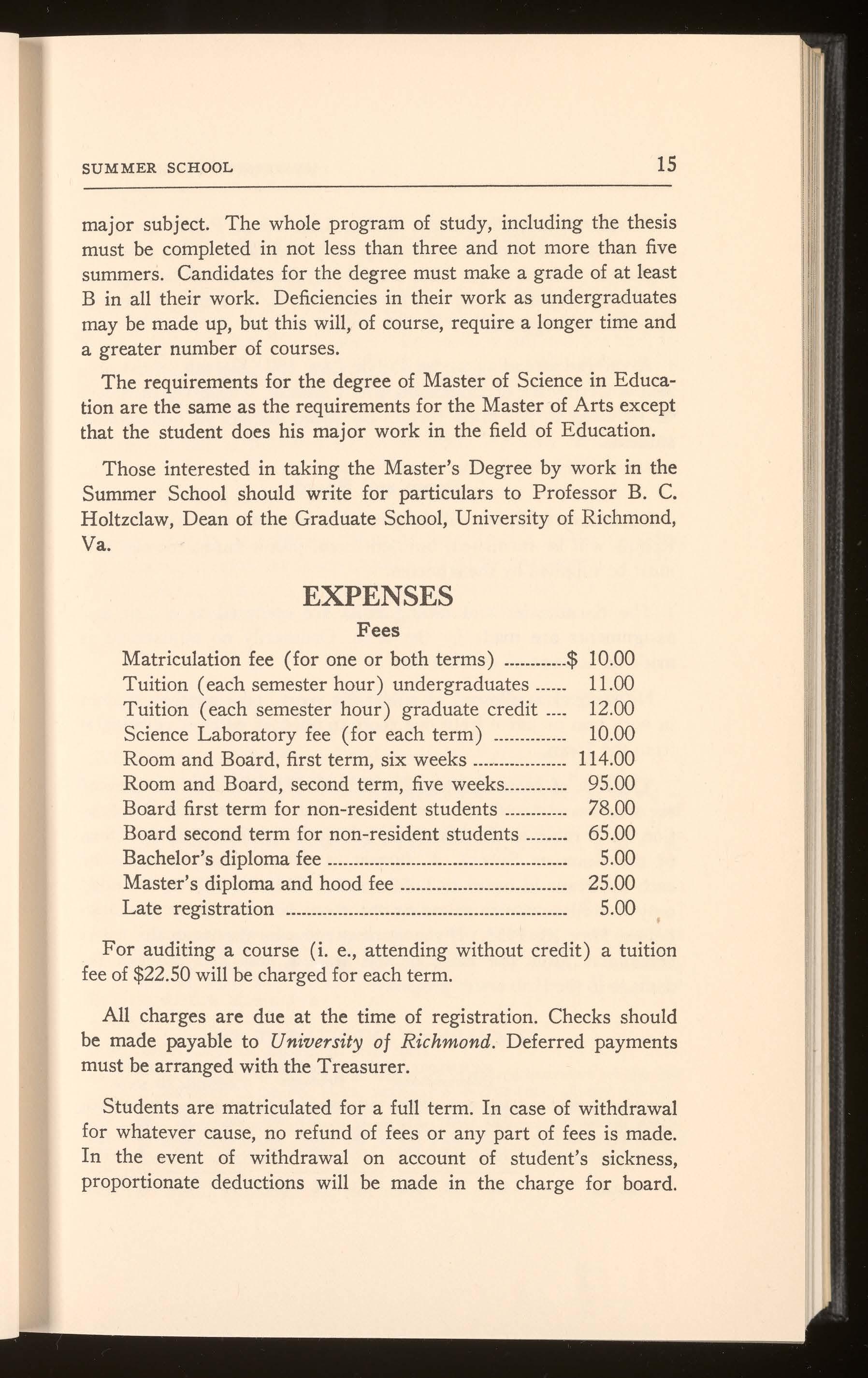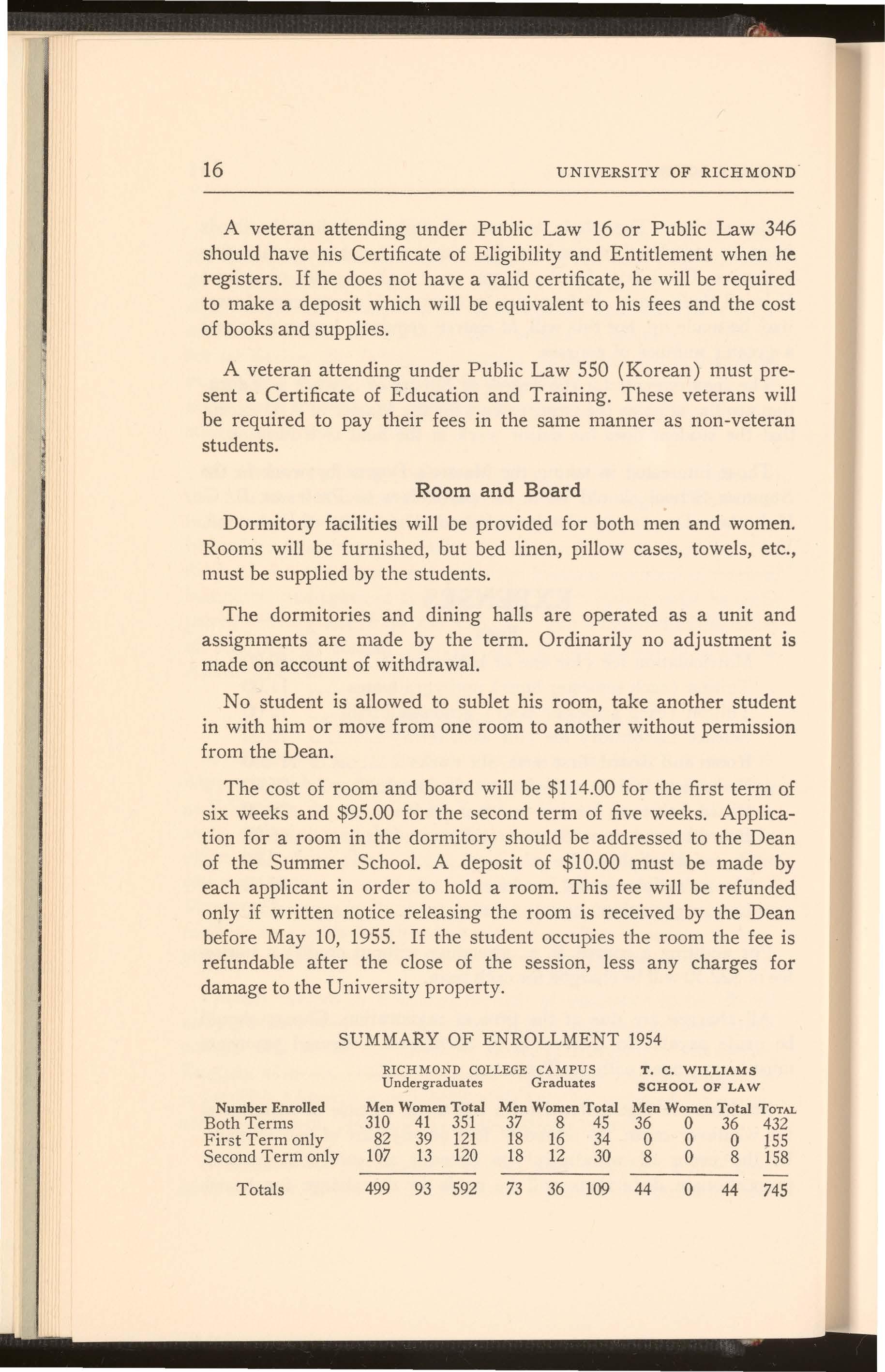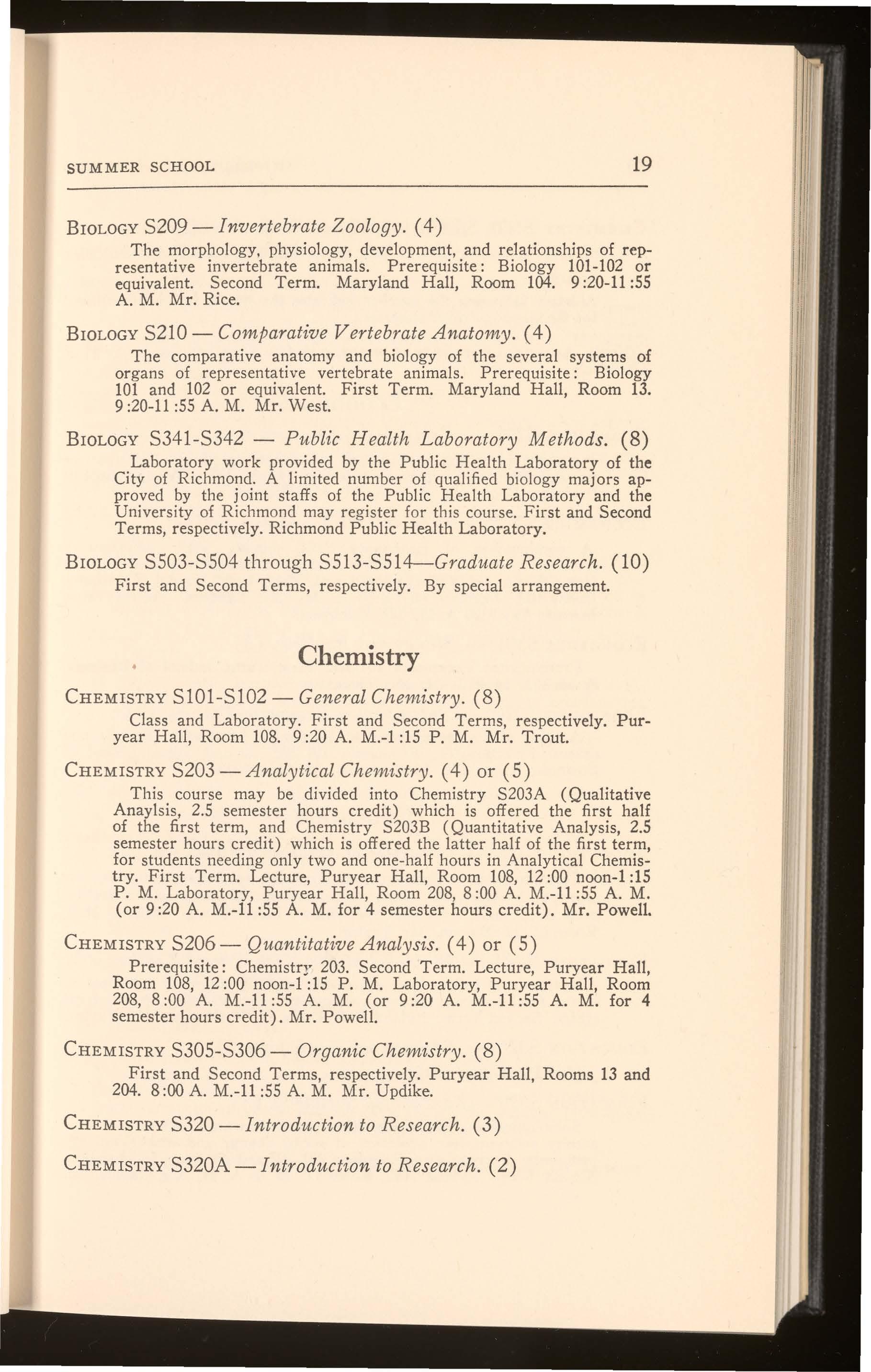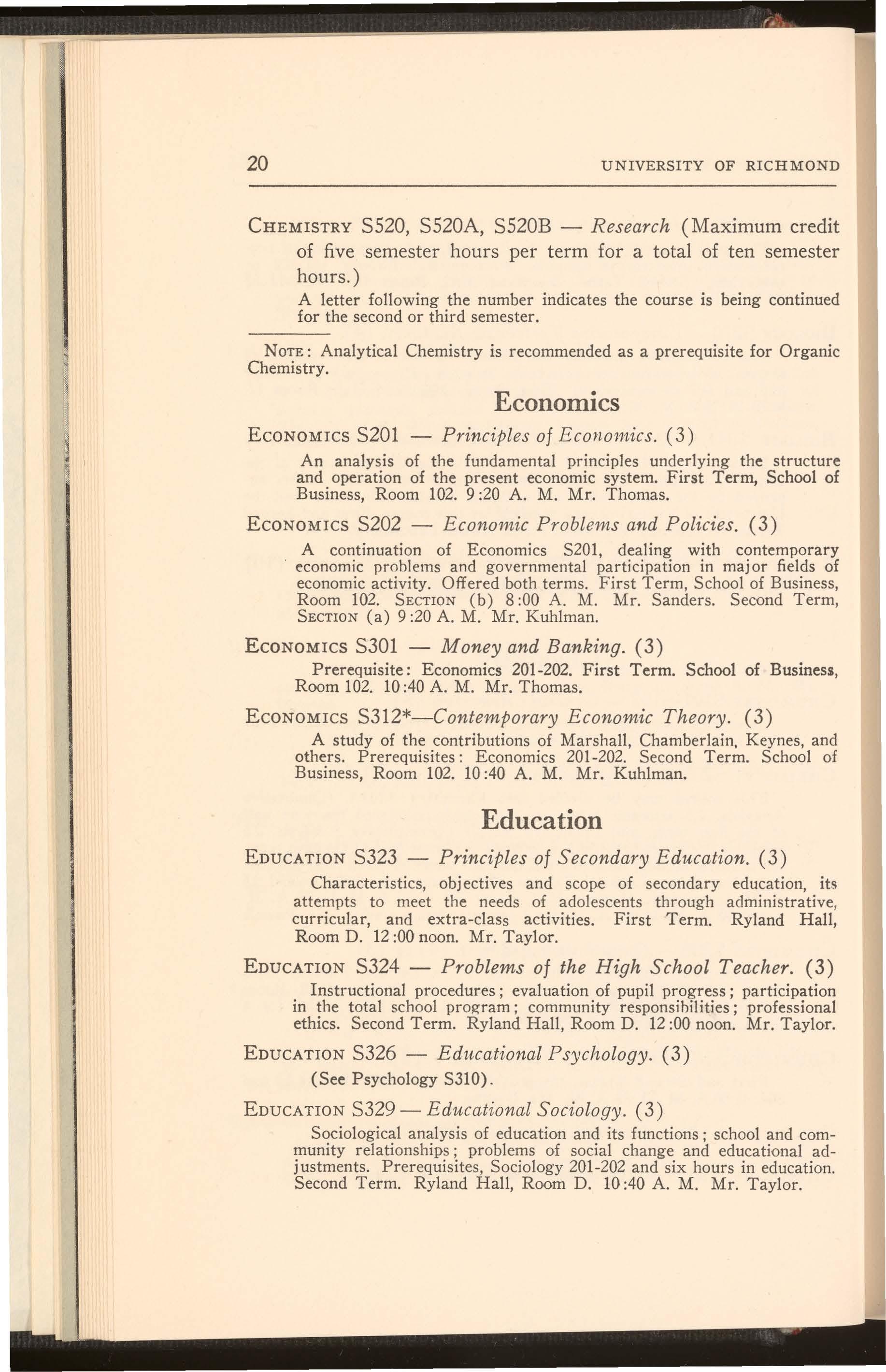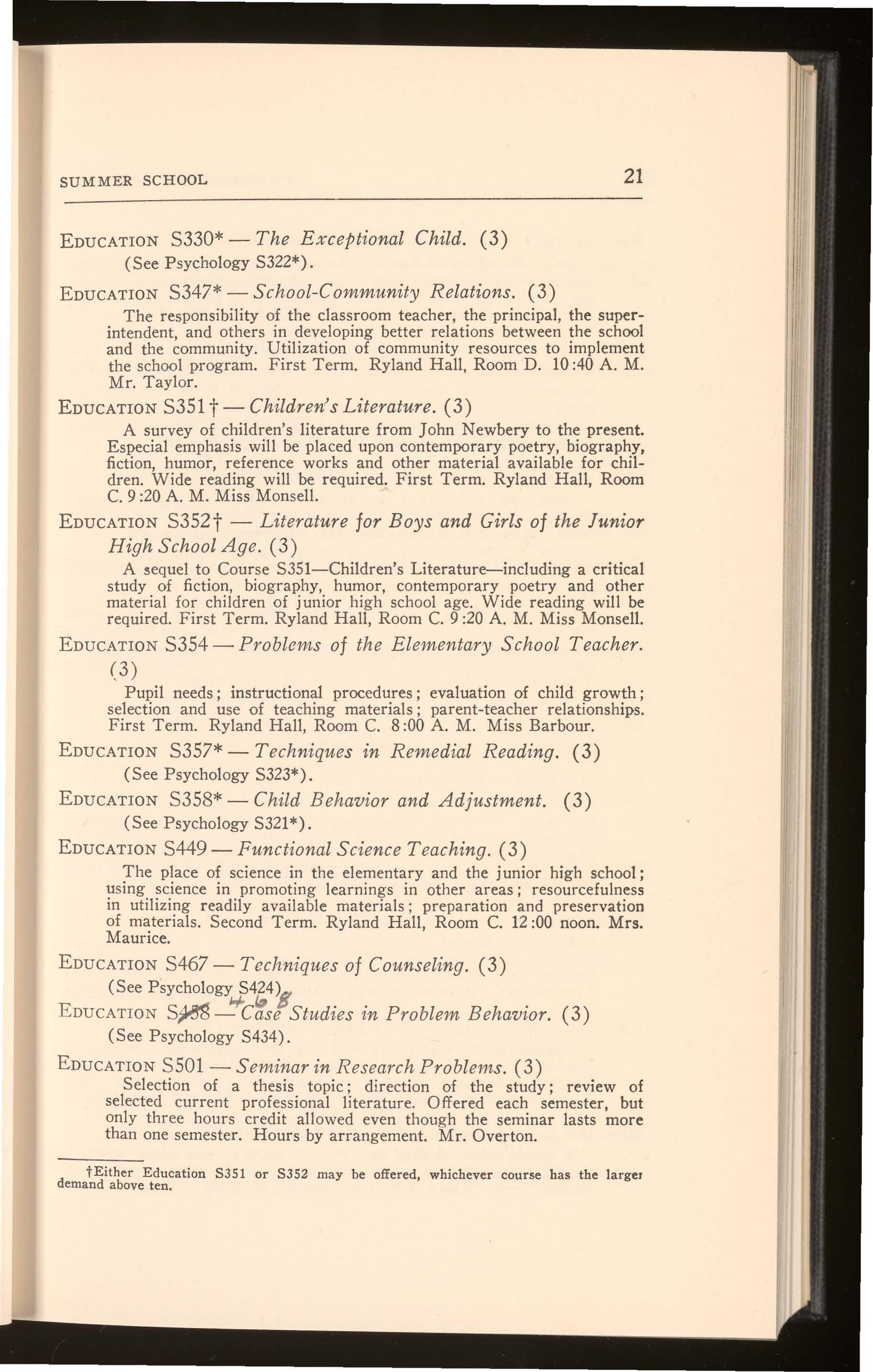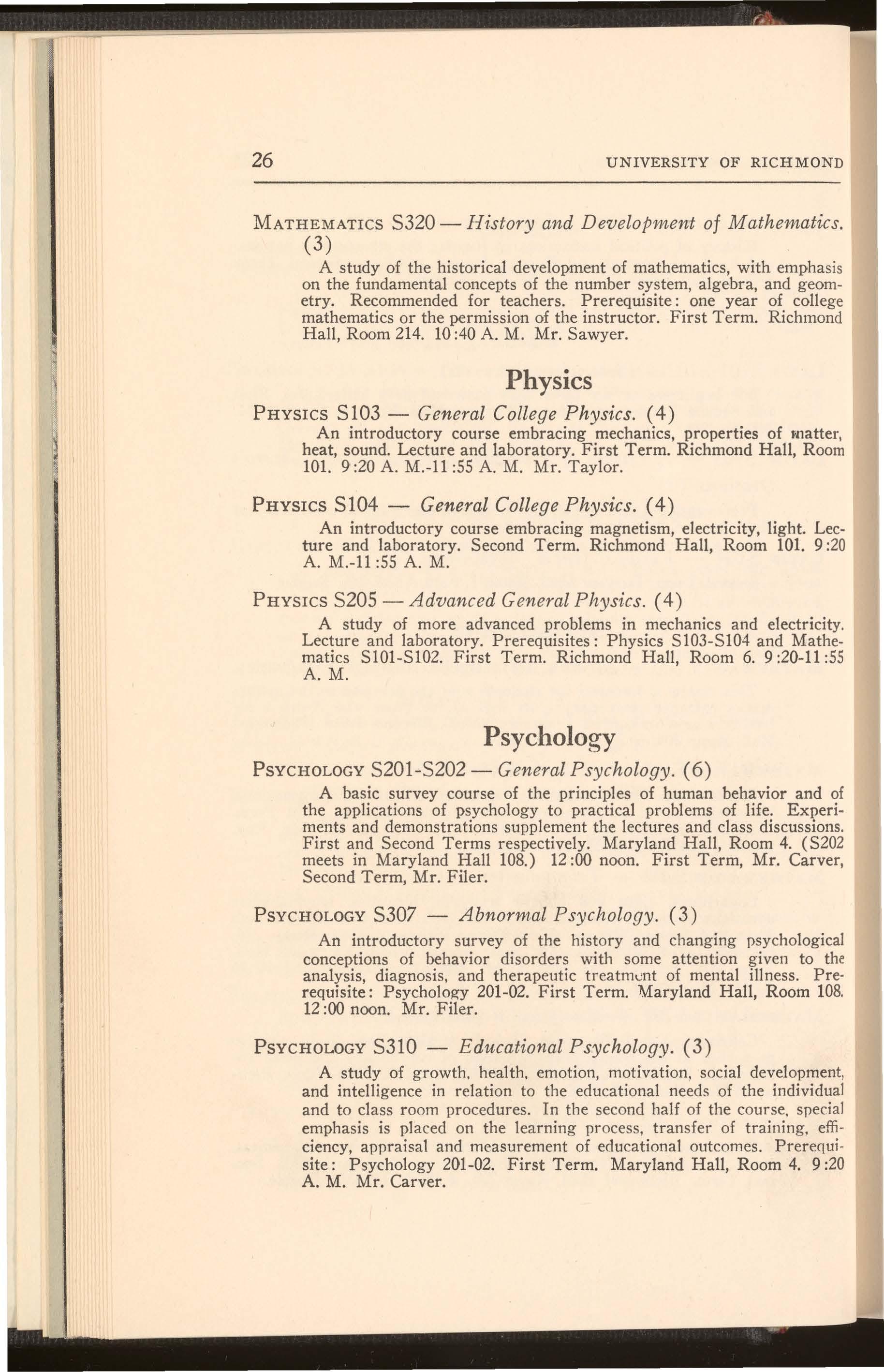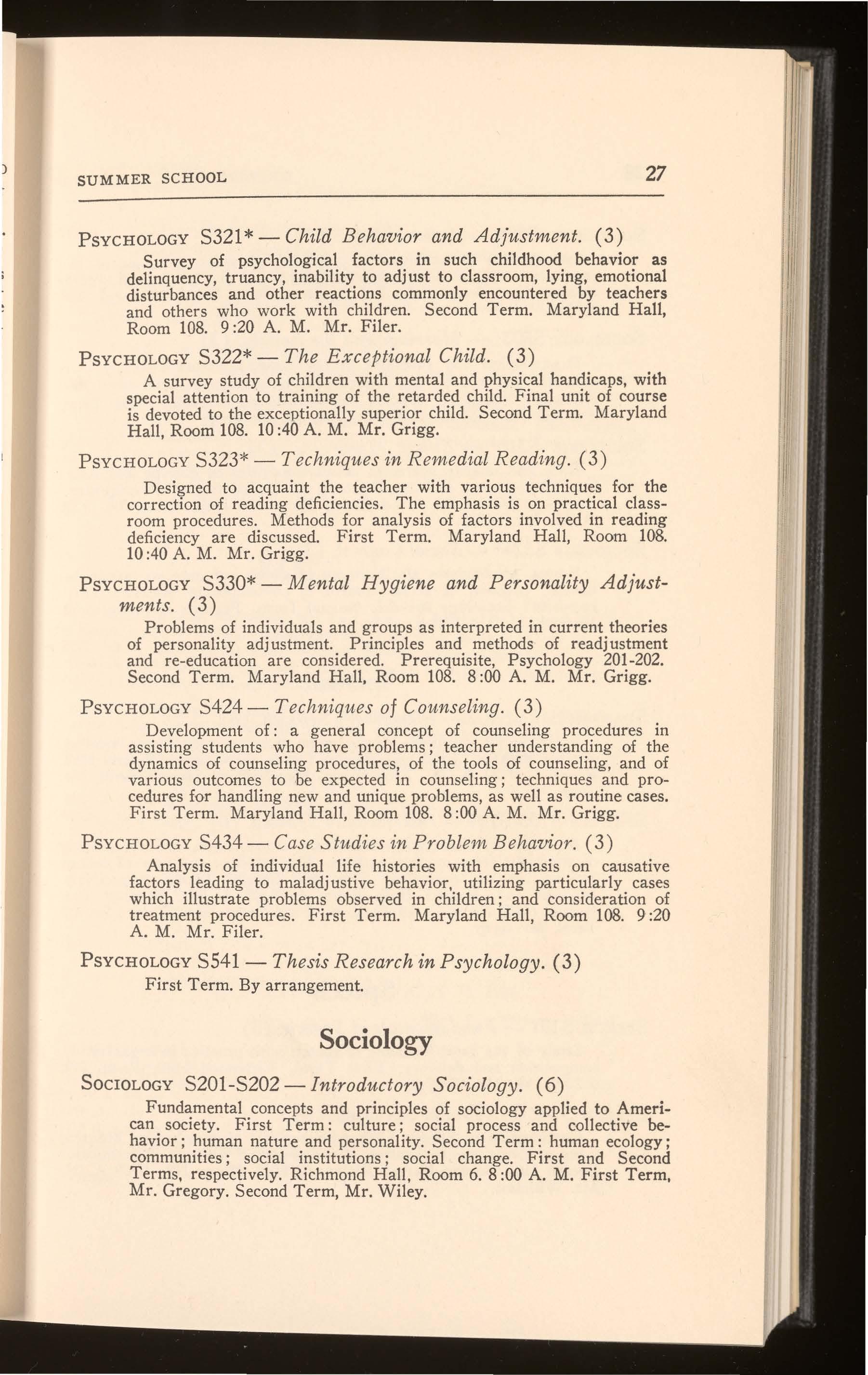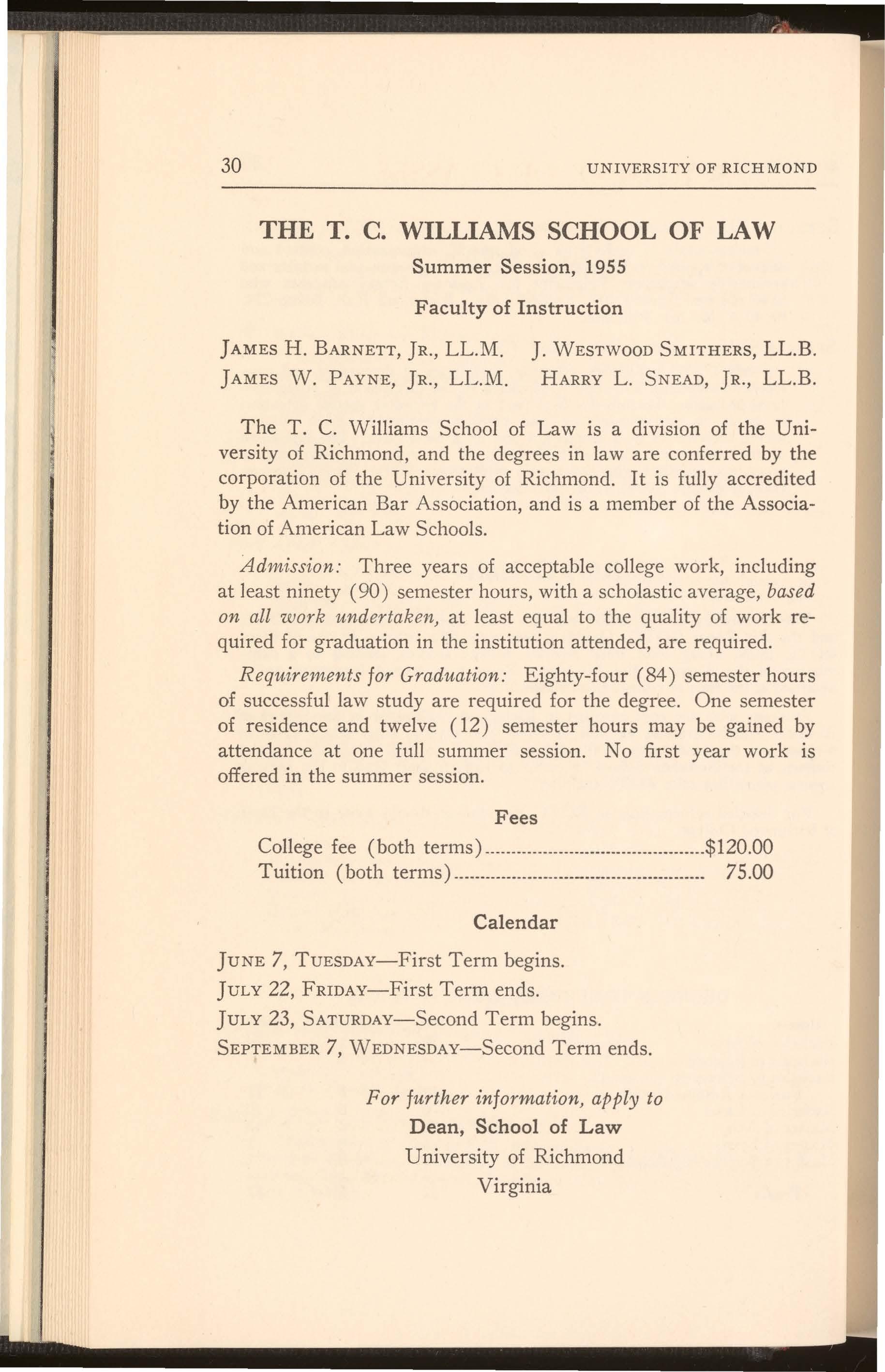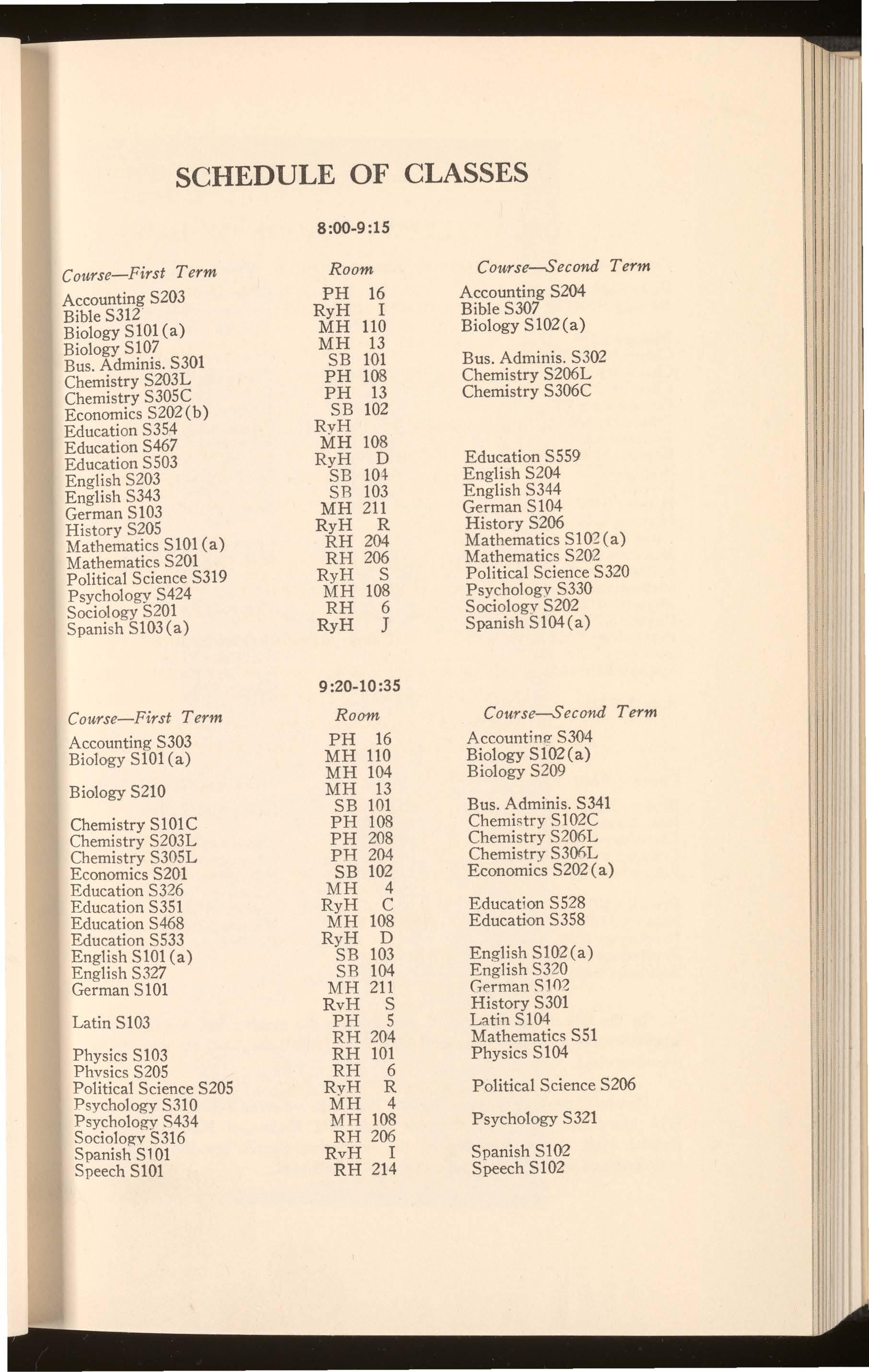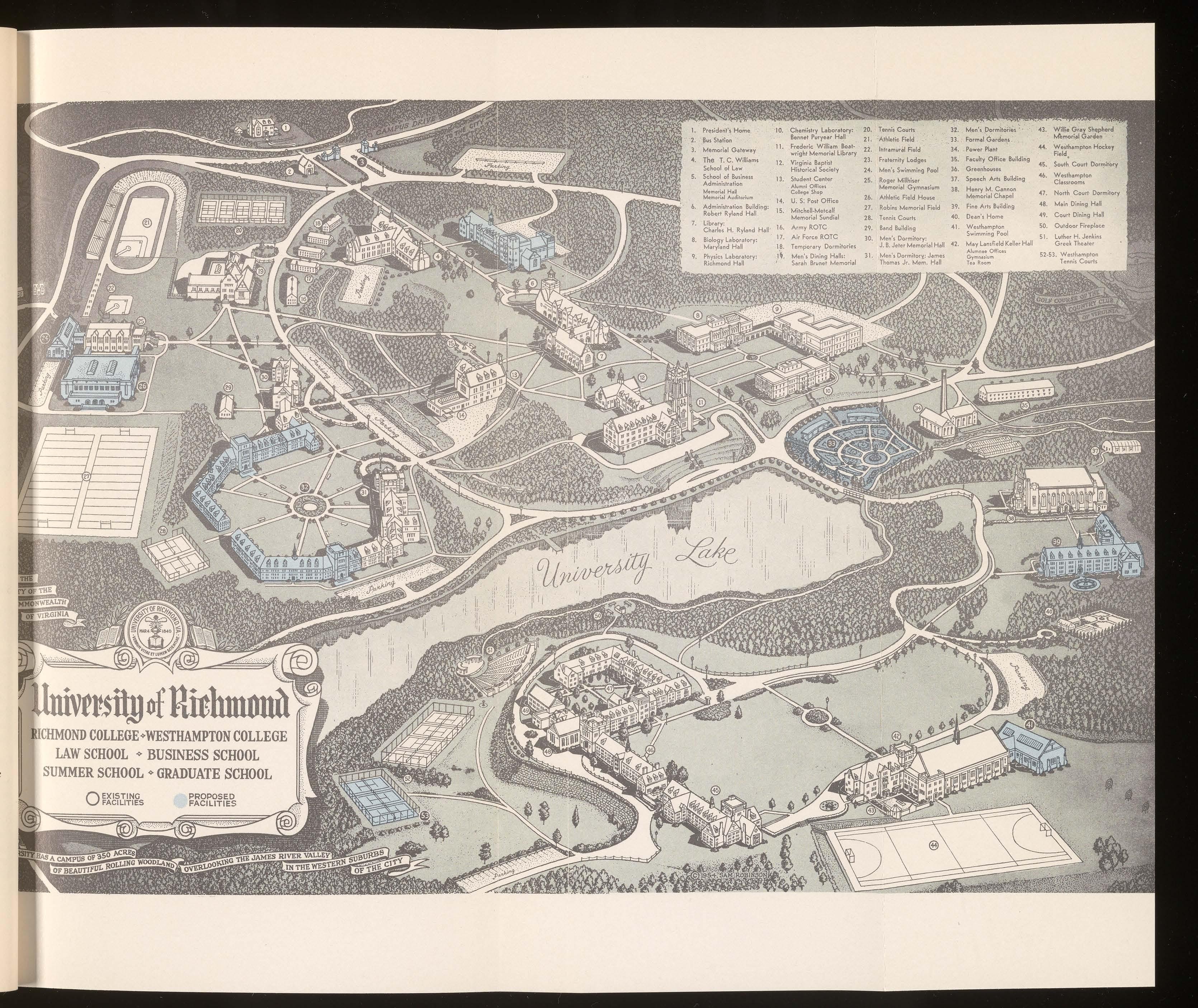CALENDAR
JUNE 13, MONDAY-Registration, 8 :30 A. M.-4 :00 P. M.
JuNE 14, TUESDAY-Classes begin at 8 :00 A. M.
JUNE 15, WEDNESDAY-Last day to make any changes in classes. Applications for degrees filed with Registrar.
JUNE 16, THURSDAY-Opening Convocation-Cannon Memorial Chapel, 10:10-10:50A. M.
JuNE 18, SATURDAY---'Classesmeet to make up for registration day.
JUNE 25, SATURDAY-Classes meet to make up for Independence Day holiday.
JuLY 4, MONDAY-Holiday for Independence Day.
JULY 21 AND 22, THURSDAYAND FRIDAY-First-term examinations.
JuLY 22, FRIDAY-First term ends .
JuLY 23, SATURDAY-Registration for second term, 8 :30 A. M. to 12:00 noon .
JULY25, MONDAY-Classes begin at 8 :00 A. M.
JuLY 26, TUESDAY-Last day for changes in classes.
AUGUST23 AND24, TUESDAYANDWEDNESDAY-Examinations for degree candidates.
AUGUST25 AND26, THURSDAYAND FRIDAY-Second-term examinations.
AUGUST26, FRIDAY-Commencement.
ADMINISTRATIVE OFFICERS
GEORGEMATTHEWSMODLIN,PH.D., LL.D President
CHARLESH. WHEELERIII, PH.D., D.Sc. Treasurer
EDWARDFRANKLINOVERTON,PH.D. Dean
RAYW. FRANTZ,JR., M.S. in L.S., PH.D. Librarian
HELEN ALBEE MONSELL, M.A. Registrar
FACULTY OF INSTRUCTION •
MALCOLML. PYE, C.P.A., PH.D. Accounting Associate Professor of Accounting
SOLONB. COUSINS,B.A., D.D., LL.D. Bible Professor of Bible
RAYMONDB. BROWN,B.D., S.T.M., TH.D. Bible Assistant Professor of Bible
ROBERTF. SMART,PH.D. Biology Professor of Biology
J. C. STRICKLAND,PH.D. Biology Associate Professor of Biology
NOLANE. RrcE, PH.D. Biology Professor of Biology
w ARWICKR. WEST, JR., PH.D. Biology Assistant Professor of Biology
}ACK D. BURKE, PH.D .. Biology Assistant Professor of Biology
THOMAS S. BERRY, PH.D. Business Administration Associate Professor of Business Administration
DAVID M. WHITE, JR., LL.B. • Business Administration Instructor in Business Administration
G. KENNETH MILLER, B.S., LL.B. • . Business Administration Visiting Lecturer
WILLIAM EDGAR TROUT, JR., PH.D. . Chemistry Professor of Chemistry
IRA A. UPDIKE, PH.D. Chemistry Visiting lecturer. Professor of Chemistry, Randolph-Macon College
w. ALLAN POWELL, PH.D Assistant Professor of Chemistry Chemistry
HERMAN P. THOMAS, PH.D. Economics Professor of Economics
JOHN M. KUHLMAN, PH.D. Economics Assistant Professor of Economics
THOMAS C. SANDERS, M.B.A. Economics Assistant Professor of Economics
EDWARD F. OVERTON, PH.D. Education Professor of Education
L. 0. TAYLOR, PH.D. Education Visiting lecturer. Professor of Education, University of Omaha
JOHN D. MEADE, M S. in Ed. Education Visiting lecturer. Superintendent of Petersburg Public Schools
ELMIRA C. MAURICE, M.S. in En .• . Education
Visiting lecturer . Assistant Principal, Oak Grove School, Richmond, Va
MARY BARBOUR, M.A. Education
Visiting lecturer. Co-ordinator of Instruction, Henrico County Public Schools
w. ROLAND GALVIN, M.A.
Education
Visiting lecturer. Principal, Westhampton Elementary and Junior High School, Richmond, Va.
HELEN A. MoNSELL, M.A. .
Education Registrar of Richmond College; Author of children's books
SAMUEL w. STEVENSON, PH.D. English Professor of English
EDWARD C. PEPLE, PH.D. English Professor of English
LEWIS F. BALL, PH.D. English Associate Professor of English
NA THANIEL H. HENRY, PH.D.
English Professor of English
FRANK F. FINNEY, M.A.
English Instructor in English
JOHN E. WHITE, III, M.A. English Instructor in English
JEAN GRAY WRIGHT, PH.D. . French Professor of French
THOMAS E. LAVENDER, PH.D. . French Associate Professor of Romance Languages
N. WILFORD SKINNER, M.A. German Assistant Professor of ·German
ROBERT R. BREWSTER, PH.D. German Assistant Professor of German
RALPH C. McDANEL, PH.D. History and Political Science Professor of History
NOBLE E. CUNNINGHAM, JR., PH.D. History Assistant Professor of History
WESLEY N. LAING, PH.D. History Assistant Professor of History
WALTER F. SNYDER, PH D. Latin Associate Professor of Classics
JOHN \;VESLEY SAWYER, PH.D. Mathematics Associate Professor of Mathematics
E. SHERMAN GRABLE, M.A. Mathematics Assistant Professor of Mathematics
FRANCIS B. KEY, M.A. M athematicJ Assistant Professor of Mathematics
MARION JEFFRIES STOKES, M.A. Mathematics Instructor in Mathematics
J. J. TAYLOR, M.S. Physics Assistant Professor of Physics
SPENCER DELANCEY ALBRIGHT, PH.D Political Science Associate Pro f essor of Political Science
MERTON E CARVER , PH.D. Psychology Professor of Ps y chol ogy
ROBERT J. FILER, PH.D. Psychology Associate Professor of P sychology
AUSTIN E. GRIGG, M.A. Psychology Assistant Professor of Psychology
E. w. GREGORY, JR., PH.D. Sociology Professor of Sociology
J. HUNDLEY WILEY, PH.D. Sociology Professor of Sociology
CLARENCE J. GRAY, A.M. Spanish Associate Professor of Modern Languages
w. FREDERICK CAYLOR, M.A. Spanish Associate Professor of Spanish
ALTON WILLIAMS, M.A. Speech Associate Professor of Speech and Dramatic Arts
JAMES L. GOLDEN, PH.D. . Speech Assistant Professor of Speech
Except as otherwise indicated, all are members of the University of Richmond faculty.
UNDERGRADUATE DEGREES
The following baccalaureate degrees are offered by the University of Richmond through its Summer School: B.A., B.S .. and B.S. in Business Administration.
The academic requirements for the several degrees are stated in semester hours. Quality credits are calculated from academic hours on the following basis: a semester hour passed with grade A shall count three quality credits; with grade B, two quality credits; with grade C, one quality credit; with grade D, no quality credit.
B.A. and B.S.-Candidates for the B.A. or B.S. degree through the Summer School must complete a minimum of thirty-six semester hours in the Summer School and attend at least three full summers. A student must select a field of concentration which will include a major and closely related subjects. His program of studies in this field must be made out under the guidance of the chairman of the department in which he wishes to major, and be filed in the Registrar's Office. His entire course is then subject to the
SUMMER SCHOOL 13
approval of the department chairman. In the majority of cases, the field of concentration will consist of twenty-four hours in the major subject and eighteen hours in related subjects approved by the major professor. In the laboratory sciences, these will be thirty and twenty semester hours respectively. For the B.S. degree the whole field of concentration will be chosen from the laboratory sciences and mathematics.
Summary of Degree Requirements
I. TOTAL SEMESTER HOURS AND QUALITY CREDITS
Candidates for degrees must pass at least 124 semester hours of work and earn at least 120 quality credits. If more than 120 hours of academic work are passed, the number of quality credits for the degree in excess of 120 is increased by the number of additional academic hours passed,
II. REQUIRED SUBJECTS
English
English 101-02, 203-04
Mathematics Mathematics 101-02 or 201-02
Mathematics 201-02 or 301-04
Foreign
Other Social Sciences: (Economics, Education, Political Science, Psychology, Sociology)
Ill. FIELD OF CONCENTRATION
IV. FREE ELECTIVE SUBJECTS
* A student by passing a special examination on high school plane geometry and algebra through quadratics, or by validating his high school course• in these subjects by completing Math. 5[.52 without college credit, may thereby satisfy the mathematics requirement for the B.A. Math. 101•02, however, is a prerequisite for all advanced science couraes,
t The foreign language requirement may be satisfied by two years in one language above course 101·102.
t student who offers Math. l0J.102 or Math. 201•202 may satisfy the natural science, rcqwrements by offering eight semester hours of credit in only one natural science.
UNIVERSITY OF RICHMOND
B.S. in Business Administration-Students who wish to enter the School of Business Administration as full-time students must have completed sixty semester hours of work including six hours of Princi;iles of Economics or its equivalent and must have accumulated a minimum of sixty quality credits. In selecting applicants for admission, the School of Business Administration is interested in men and women with well-rounded libe1al arts backgrounds who have given evidence of earnestness of purpose and have demonstrated leadership qualities.
A minimum of sixty semester hours of work must be taken in the School of Business Administration for the degree. This total includes twenty-nine hours in basic required courses, twenty-four hours in a field of concentration, and seven hours of electives. The fields of concentration are accounting, business economics, finance, insurance, management and marketing. Each course must be completed with a grade of no less than "C". For a detailed explanation of this degree, consult the catalogue of the School of Business Administration.
GRADUATE DEGREES
It is possible for a student who has a standard B.A. or B.S. degree to take the degree of Master of Arts, or Master of Science in Education, by work in the Summer School, provided his work as an undergraduate has been of such quality as to put him in the upper half of his class. Some graduate work may be done in the summer session toward the degrees of Master of Science and Master of Science in Business Administration, but not enough work in these two fields is offered at present to allow a person to complete the requirements for the degree in the summer session only.
Certain courses in a limited number of subjects will be offered on a graduate level in the Summer School. For this summer, these courses will be in the fields of Biology, Economics, Education, English, History, Political Science, Psychology and Sociology. It is possible, however, that special work may be arranged for graduate students with professors in other subjects as well.
Candidates for the Master's Degree must complete a minimum of 27 semester hours work and submit a satisfactory thesis in their
major subject. The whole program of study, including the thesis must be completed in not less than three and not more than five summers. Candidates for the degree must make a grade of at least B in all their work. Deficiencies in their work as undergraduates may be made up, but this will, of course, require a longer time and a greater number of courses.
The requirements for the degree of Master of Science in Education are the same as the requirements for the Master of Arts except that the student does his major work in the field of Education.
Those interested in taking the Master's Degree by work in the Summer School should write for particulars to Professor B. C. Holtzclaw, Dean of the Graduate School, University of Richmond, Va.
EXPENSES
Fees
Matriculation fee ( for one or both terms)
Tuition ( each semester hour) undergraduates
Tuition ( each semester hour) graduate credit
Science Laboratory fee ( for each term)
Room and Board, first term, six weeks
Room and Board, second term, five weeks
Board first term for non-resident students
Board second term for non-resident students
Bachelor's
Master's diploma and hood fee··········-···-·······-·······-·
Late registration
For auditing a course (i. e., attending without credit) a tuition fee of $22.50 will be charged for each term.
All charges are due at the time of registration. Checks should be made payable to University of Richmond. Deferred payments must be arranged with the Treasurer.
Students are matriculated for a full term. In case of withdrawal for whatever cause, no refund of fees or any part of fees is made. In the event of withdrawal on account of student's sickness, proportionate deductions will be made in the charge for board.
UNIVERSITY OF RICHMOND -
A veteran attending under Public Law 16 or Public Law 346 should have his Certificate of Eligibility and Entitlement when he registers. If he does not have a valid certificate, he will be required to make a deposit which will be equivalent to his fees and the cost of books and supplies
A veteran attending under Public Law 550 (Korean) must present a Certificate of Education and Training. These veterans will be required to pay their fees in the same manner as non-veteran students.
Room and Board
Dormitory facilities will be provided for both men and women . Rooms will be furnished, but bed linen, pillow cases, towels, etc., must be supplied by the students.
The dormitories and dining halls are operated as a unit and assignments are made by the term. Ordinarily no adjustment is made on account of withdrawal.
No student is allowed to sublet his room, take another student in with him or move from one room to another without permission from the Dean.
The cost of room and board will be $114 .00 for the first term of six weeks and $95.00 for the second term of five weeks . Application for a room in the dormitory should be addressed to the Dean of the Summer School. A deposit of $10 .00 must be made by each applicant in order to hold a room. This fee will be refunded only if written notice releasing the room is received by the Dean before May 10, 1955. If the student occupies the room the fee is refundable after the close of the session, less any charges for damage to the University property
SUMMARY OF ENROLLMENT 1954
RICHMO N D COLLEGE CAMPUS T. C. WILLIAMS U n~ergraduates Graduates SCHOOL OF LAW
COURSES OF INSTRUCTION
Courses numbered 100-199, inclusive, are intended primarily for freshmen; those numbered 200-299, inclusive, for sophomores; those numbered 300-399, inclusive, for juniors and seniors and, in some cases, for graduate students; those numbered 400-499 require work of a research nature for graduate credit; those numbered 500-599 are for graduate students only. Courses numbered 300-399 whose number is followed by an asterisk (*) may be taken by graduate students for graduate credit as one of the "400" courses mentioned above.
The figure in parentheses following the title of a course indicates the number of semester hours credit allowed for that course. vVhere two numbers, separated by a hyphen, follow the title of a full year course, either half of the course may be taken without the other half.
Accounting and Business Administration
AccouNTING S203-204 - Fundamentals of Accouuting. (6)
A course designed for those who wish to prepare themselves for accounting, or who seek an understanding of accounting as an aid in a business or profession. It covers the basic accounting principles and records of corporations, partnerships, and sole proprietorships. First and Second Terms, respectively. Puryear Hall, Room 16, 8 :00 A. M. Mr. Pye.
AccouNTING S303-304 - Intermediate Accounting. (6)
Expansion and illustration of the various principles covered in first year accounting. Detailed discussion of the nature of the more important items appearing in financial statements. Prerequisite: Accounting 203-204. First and Second Terms, respectively. Puryear Hall, Room 16, 9 :20 A. M. Mr. Pye .
B.A. S301-S302 - Business Law. (6)
Introduction to nature and source of law; fundamentals of the law of contracts, property, sales, negotiable instruments, agency partnerships, corporations; application of law fundamentals to business practice. Required of all degree candidates. First and Second Terms. School of Business, Room 101. 8 :00 A. M. First Term, Mr. White; Second Term, Mr. Miller.
UNIVERSITY OF RICHMOND
B.A. S307 - Business Statistics. ( 3)
Construction, use and interpretation of statistical tables, charts, diagrams, indexes, deviation curves and correlation with special emphasis on uses in business. Prerequisite : College Algebra, or permission of the instructor. First term. School of Business, Room 103. 12 :00 noon. Mr. Sanders.
B.A. S341-Industrial Management. (3)
The course covers the field of management and provides a foundation for advanced management training. It deals with the problems of budgets, planning, policies and procedures, and industrial relations. Required of all degree candidates. Second term. School of Business, Room 101. 9 :20 A. M. Mr. Berry.
Bible
BIBLE S307 - The Religion of the Hebrew Prophets. ( 3)
A study of the Hebrew Prophets and the relevance of their messages to our world today. Second Term. Ryland Hall, Room I. 8 :00 A. M. Mr. Cousins.
BIBLE S310-The Letters of Paul. (3)
A study of the letters of Paul, their background, and their meaning for today. Second Term. Ryland Hall, Room I. 10 :40 A. M. Mr. Cousins.
BIELE S312 - Biblical Backgrounds. ( 3)
An approach to the study of the Bible. How to know the Bible. First Term. Ryland Hall, Room I. 8 :00 A. M. Mr. Brown.
BIBLE S320-The Writings of John. (3)
The John books. The Gospel of John, the Epistles of John and the Book of Revelations. First Term. Ryland Hall, Room I. 10 :40 A. M. Mr. Brown.
Biology
BIOLOGY S101-S102 - Principles of Biology. (8)
The fundamental principles of Biology and their application to man. First and Second Terms, respectively. Maryland Hall, Room 110. SECTION(a) 8 :00-10 :35 A. M. First Term, Mr. Smart; Second Term, Mr. Burke. SECTION(b) 10 :40 A. M.-1 :15 P. M. First Term, Mr. Strickland; Second Term, Mr. West.
BIOLOGY S107 -Personal and Community Health. (2)
Human biology and hygiene, including the structure and functions of the human body in relation to personal and community health. First Term. Maryland Hall, Room 13. 8 :00 A. M. Mr. Rice.
BIOLOGY S209 - Invertebrate Zoology. ( 4)
The morphology, physiology, development, and relationships of representative invertebrate animals. Prerequisite: Biology 101-102 or equivalent. Second Term. Maryland Hall, Room 104. 9 :20-11 :55 A. M. Mr. Rice.
BIOLOGY S210- Comparative Vertebrate Anatomy. ( 4)
The comparative anatomy and biology of the several systems of organs of representative vertebrate animals. Prerequisite: Biology 101 and 102 or equivalent. First Term. Maryland Hall, Room 13. 9 :20-11 :55 A. M. Mr. West.
BIOLOGY S341-S342 - Public Health Laboratory Methods. (8)
Laboratory work provided by the Public Health Laboratory of the City of Richmond. A limited number of qualified biology majors approved by the joint staffs of the Public Health Laboratory and the University of Richmond may register for this course. First and Second Terms, respectively. Richmond Public Health Laboratory.
BIOLOGY SS03-SS04 through S513-S514--Graduate Research. ( 10)
First and Second Terms, respectively. By special arrangement.
Chemistry
CHEMISTRY S101-S102 - General Chemistry. (8)
Class and Laboratory. First and Second Terms, respectively. Puryear Hall, Room 108. 9 :20 A. M.-1 :15 P. M. Mr. Trout.
CHEMISTRY S203 -Analytical Chemistry. ( 4) or ( S)
This course may be divided into Chemistry S203A (Qualitative Anaylsis, 2.5 semester hours credit) which is offered the first half of the first term, and Chemistry S203B ( Quantitative Analysis, 2.5 semester hours credit) which is offered the latter half of the first term, for students needing only two and one-half hours in Analytical Chemistry. First Term. Lecture, Puryear Hall, Room 108, 12 :00 noon-1 :15 P. M. Laboratory, Puryear Hall, Room 208, 8 :00 A. M.-11 :55 A. M. ( or 9 :20 A. M.-11 :55 A. M. for 4 semester hours credit). Mr. Powell.
CHEMISTRY S206 - Quantitative Analysis. ( 4) or ( S)
Prerequisite: Chemistrr 203. Second Term. Lecture, Puryear Hall, Room 108, 12 :00 noon-1 :15 P. M. Laboratory, Puryear Hall, Room 208, 8 :00 A. M.-11 :55 A. M. (or 9 :20 A. M.-11 :55 A. M. for 4 semester hours credit). Mr. Powell.
CHEMISTRY S305-S306- Organic Chemistry. (8)
First and Second Terms, respectively. Puryear Hall, Rooms 13 and 204. 8:00 A. M.-11 :55 A. M. Mr. Updike.
CHEMISTRY S320-Introduction to Research. (3)
CHEMISTRY S320A- Introduction to Research. (2)
UNIVERSITY OF RICHMOND
CHEMISTRY S520, S520A, S520B - Research (Maximum credit of five semester hours per term for a total of ten semester hours.)
A letter following the number indicates the course is being continued for the second or third semester.
NOTE: Analytical Chemistry is recommended as a prerequisite for Organic Chemistry.
Economics
ECONOMICS S201 - Principles of Economics. (3)
An analysis of the fundamental principles underlying the structure and operation of the present economic system. First Term, School of Business, Room 102. 9 :20 A. M. Mr. Thomas.
EcoNoMrcs S202 - Economic Problems and Policies. (3)
A continuation of Economics S201, dealing with contemporary economic problems and governmental participation in major fields of economic activity. Offered both terms. First Term, School of Business, Room 102. SECTION (b) 8 :00 A . M. Mr. Sanders. Second Term, SECTION(a) 9 :20 A. M. Mr. Kuhlman.
EcoNOMICS S301 - Money and Banking. (3)
Prerequisite: Economics 201-202. First Term. School of Business, Room 102. 10 :40 A. M. Mr. Thomas.
EcoNOMICS S312*-Contemporary Economic Theory. (3)
A study of the contributions of Marshall, Chamberlain, Keynes, and others. Prerequisites: Economics 201-202. Second Term. School of Business, Room 102. 10 :40 A. M. Mr. Kuhlman.
Education
EDUCATION S323 - Principles of Secondary Education. (3)
Characteristics, objectives and scope of secondary education, its attempts to meet the needs of adolescents through administrative, curricular, and extra-class activities. First Term. Ryland Hall, Room D. 12 :00 noon. Mr. Taylor.
EDUCATION S324 - Problems of the High School Teacher. (3)
Instructional procedures; evaluation of pupil progress; participation in the total school program; community responsibilities; professional ethics. Second Term. Ryland Hall, Room D. 12 :00 noon. Mr. Taylor.
EDUCATION S326 - Educational Psychology. (3)
(See Psychology S310).
EDUCATION S329- Educational Sociology. ( 3)
Sociological analysis of education and its functions; school and community relationships; problems of social change and educational adjustments. Prerequisites, Sociology 201-202 and six hours in education. Second Term. Ryland Hall, Room D. 10 :40 A. M. Mr. Taylor.
SCHOOL
EDUCATION S330* - The Exceptional Child. (3)
( See Psychology S322*).
EDUCATION S347* - School-Community Relations. (3)
The responsibility of the classroom teacher, the principal, the superintendent, and others in developing better relations between the school and the community. Utilization of community resources to implement the school program. First Term. Ryland Hall, Room D. 10 :40 A. M. Mr. Taylor.
EDUCATION S351 t- Children's Literature. ( 3)
A survey of children's literature from John Newbery to the present. Especial emphasis will be placed upon contemporary poetry, biography, fiction, humor, reference works and other material available for children. Wide reading will be required. First Term. Ryland Hall, Room C. 9 :20 A. M. Miss Monsell.
EDUCATION S352t - Literature for Boys and Girls of the Junior High School Age. (3)
A sequel to Course S351-Children's Literature-including a critical study of fiction, biography, humor, contemporary poetry and other material for children of junior high school age. Wide reading will be required. First Term. Ryland Hall, Room C. 9 :20 A. M. Miss Monsell.
EDUCATION S354-Problems of the Elementary School Teacher. (3)
Pupil needs; instructional procedures; evaluation of child growth; selection and use of teaching materials; parent-teacher relationships. First Term. Ryland Hall, Room C. 8 :00 A. M. Miss Barbour.
EDUCATION S357* - Techniques in Remedial Reading. (3) ( See Psychology S323*).
EDUCATION S358* - Child Behavior and Adjustment. (3) ( See Psychology S321 *).
EDUCATION S449-Functional Science Teaching. (3)
The place of science in the elementary and the junior high school; using science in promoting learnings in other areas ; resourcefulness in utilizing readily available materials; preparation and preservation of materials. Second Term. Ryland Hall, Room C. 12 :00 noon. Mrs. Maurice.
EDUCATION S467 - Techniques of Counseling. (3) ( See Psychology S424
EDUCATION S~ -' "''"c~se Studies in Problem Behavior. (3) ( See Psychology S434).
EDUCATION S501-Seminarin Research Problems. (3)
Selection of a thesis topic; direction of the study; review of selected current professional literature. Offered each semester, but only three hours credit allowed even though the seminar lasts more than one semester. Hours by arrangement. Mr. Overton.
tEither Education SJS 1 or SJS2 may be offered, whichever course has the large, demand above ten.
UNIVERSITY OF RICHMOND
EDUCATION SS03 -Public School Finance. ( 3)
Principles of school finance; sources of revenue for schools; budgeting, including the performance type; accounting; cost analysis; auditing; trends and needs in federal, state and local policies and practices. First Term. Ryland Hall, Room D. 8 :00 A. M. Mr. Meade.
EDUCATION SS28 - The Wark of the High School Principal. (3)
Organization of the High School ; supervision of instruction; inservice training of teachers; the non-teaching staff; student activities; guidance functions of the principal; relationship of the school and the community. Prerequisite: Education 323, 324, 325, 326, or the equivalent. Second Term. Ryland Hall, Room C. 9 :20 A. M.
EDUCATION S533 - Educational Administration. ( 3)
State, city and county educational organization; supervision as a function of administration. Prerequisite: Education S528 or S559. First Term. Ryland Hall, Room C. 12 .00 noMt. Mr. Meade
EDUCATION SS59- The Wark of the Elementary School Principal. (3)
Philosophy of the modern elementary school ; relation to the secondary school and the community; developing a functional instructional program based on the needs of children; supervisory and guidance functions of the principal. Prerequisite: 12 hours in Education. Second Term. Ryland Hall, Room D. 8 :00 A. M. Mr. Galvin.
English
ENGLISH SlOl - Rhetoric and Composition. (3)
The elements of writing in theory and practice, primarily in expository form. Frequent written assignments and one research paper to illustrate the use of library sources and preparation of bibliography and footnotes. First Term. SECTION(a), School of Business, Room 103. 9 :20 A. M. Mr. Stevenson; SECTION(b), School of Business, Room 104. 10 :40 A. M. Mr. Ball.
ENGLISH S 102 - Rhetoric and Com position . ( 3)
A continuation of English S!Ol, with emphasis on description and narration, including a study of the short story and novel. Second Term. SECTION(a), School of Business , Room 103 9 :20 A. M. Mr. Henry. SECTION(b), School of Business. Room 104. 10 :40 A. M. Mr. White
ENGLISH S203 - Survey of English Literature. (3)
Analyses of the major works of English literature from Beowulf to Milton, along with a consideration of the historical backgrounds. Reading assignments, lectures, recitation, and parallel reading. First Term. School of Business, Room 104. 8 :00 A. M. Mr. Peple.
ENGLISH S204 - Survey of Engl ish Literature. ( 3)
A continuation of English S203. A study of the major works in English literature from the Restoration through the Nineteenth Century Second Term. School of Business, Room 104. 8 :00 A. M. Mr. Finney.
ENGLISH S315* - Shakespeare. ( 3)
A study of the earlier plays - comedies, histories, and tragedies. First Term. School of Business, Room 103. 10 :40 A. M. Mn Stevenson.
ENGLISH S316* - Shakespeare. (3)
A study of the tragedies of Shakespeare's maturity-Hamlet, Macbeth, Othello, King Lear. Second Term. School of Business, Room 103. 10 :40 A. M. Mr. Henry.
ENGLISH S320*-Poetry of the Victorian Period. (3)
A study of the poetry of Tennyson, Browning, Arnold, Rosetti, Morris, and Swinburne. Second Term. School of Business, Room 104. 9 :20 A. M. Mr. Finney.
ENGLISH S327* - The Development of the English Language. ( 3)
An introduction to the study of language sciences and a special study of the historical development of English, its grammar, vocabulary, and sentence structure. (This course fulfills the requirement of English 328 for English majors.) Especially recommended for teachers of English and Language Arts. First Term. School of Business, Room 104. 9 :20 A. M Mr. Peple.
ENGLISH S343* - Contemporary British and American Literature. (3)
A study of British and American literature, both poetry and prose, since 1914. Selections from the works of such writers as Robinson, Frost, Yeats, Eliot, Stevens, Dreiser, Anderson, Cather, Lewis, Hemingway, Fitzgerald, O'Neill, Coward, Joyce, Woolf. First Term. School of Business, Room 103. 8 :00 A. M. Mr. Ball.
ENGLISH S344* - Cont emporary British and Am erican Literature. (3)
A continuation of S343. Studies in the works of such writers as Sandburg, Williams, Dos Passos Wolfe, Faulkner, Paul Green, Steinbeck, Auden, Toynbee, Dylan Thomas, Irwin Shaw. Second Term. School of Business, Room 103. 8 :00 A. M. Mr. White.
French
FRENCH S101-S102-Elementary French (6)
A course for beginners, consisting of elementary grammar, reading, conversation. First and Second Terms , respectively. School of Business, Room 101. 10 :40 A. M. First Term, Mr. Lavender . Second Term, Miss Wright.
FRENCH S103-S104 - Intermediate French. (6)
A review of grammar, composition, conversation, and the reading of selections from modern authors. Prerequisite: one year of college French , or the equivalent. First and Second Terms, respectively. School of Business, Room 101. 12 :00 noon. First Term, Mr. Lavender. Second Term, Miss Wright
UNIVERSITYOF RICHMOND
German
GERMANS1O1-S102 - Elementary German. (6)
This course will consist of a study of elementary grammar, pronunciation, reading and conversation First and Sec"nd Terms, respectively. Maryland Hall, Room 211. 9 :20 A. M. First Term, Mr. Skinner. Second Term, Mr. Brewster.
GERMANSl03-SlO4- Intermediate German. (6)
A review of grammar, composition, conv~rsation. and the reading of selections from modern authors. Prereqm~ite: one year of college German, or the equivalent. First and Second Terms, respectively. Maryland Hall, Room 211. 8 :00 A. M. First Term, Mr. Skinner. Second Term, Mr. Brewster.
Historv and Political Science
HISTORYS1O7-Sl08- Survey of European Civilization. (6)
A rapid survey of the civilization of the Western world from about 4000 B. C. to the present. History S107 ends at 1660 and History S108 is from 1660 to the present. The course is required of all Richmond College and Summer School students who are candidates for the B.A. or B.S. degrees. First and Second Terms, respectively. SECTION(a), Ryland Hall, Room R. 10 :40 A. M. Mr. Cunningham. SECTION(b), Ryland Hall, Room R. 12 :00 noon. Mr. Laing.
HISTORYS2O5 -American History to 1865. ( 3) First Term. Ryland Hall, Room R. 8 :00 A. M. Mr. Cunningham.
HISTORYS206-American History 1865 to the Present. (3) Second Term. Ryland Hall. Room R. 8 :00 A M. Mr. McDanel.
HISTORYS3O1* - History of the Far East. ( 3)
A survey of the history of the Far East from earliest times to the present. Emphasis is put on the history of China and Japan and on the period since 1800. Second Term. Ryland Hall, Room S. 9 :20 A. M. Mr. McDanel.
HISTORYS319* - History of Virginia. (3)
Virginia history from 1607 to the present. This course is designed to prepare students to teach Virginia history in the public and private elementary and secondary schools. First Term. Ryland Hall, Room S. 10 :40 A. M. Mr. Laing.
POLITICALScIENCE S2O5 - American Government. (3) First Term. Ryland Hall, Room R. 9 :20 A. M. Mr. McDanel.
POLITICALScIENCE S2O6 - American Government. (3)
Continuation of Political Science S205, which is a prerequisite. Second Term. Ryland Hall, Room R. 9 :20 A. M. Mr. Albright.
POLITICALSCIENCE319* - Foreign Affairs. (3)
The conduct and problems of international affairs among the major powers of the world. (Not open to students who have had Political Science 313-314 in Richmond College.) First Term. Ryland Hall, Room S. 8 :00 A. M. Mr. McDanel.
POLITICALSCIENCES320* - Soviet Government. (3)
History of political institutions in Russia; the structure of national and local government and Russian foreign relations. Second Term. Ryland Hall, Room S. 8 :00 A. M. Mr. Albright.
Latin
LATIN S101-S102-Elementary Latin. (6)
For beginners or for those who have had very little Latin. First and Second Terms, respectively. Puryear Hall, Room 5. 10 :40 A. M. Mr. Snyder.
LATIN S103 - A review of grammar, composition and Cicero's Orations. ( 3)
Prerequisite: Latin 101-2, or its equivalent. First Term. Puryear Hall, Room 5. 9 :20 A. M. Mr. Snyder.
LATIN S104 - Vergil's Aeneid; Mythology. (3)
Second Term. Puryear Hall, Room 5. 9 :20 A. M. Mr. Snyder.
Mathematics
MATHEMATICSS51 -Algebra. (0) Algebra through Quadratics. This course is intended for students who are deficient in the mathematics entrance requirements, as well as for those who desire a refresher course in algebra. Tuition: $33.00. Second Term. Richmond Hall, Room 204. 9 :20 A. M. Mr. Key.
MATHEMATICSS101 - College Algebra. (3)
Simultaneous linear equations, quadratic equations, ·progressions, binomial theorem, theory of equations and determinants. First Term. Richmond Hall, Room 204. SECTION (a) 8 :00 A. M. Mr. Key. SECTION(b) 10 :40 A. M. Mrs. Stokes.
MATHEMATICSS102 - Trigonometry. (3)
Logarithms, right and oblique triangles, identities, trigonometric equations, complex numbers, and DeMoivre's Theorem. Offered both First and Second Terms. First Term. Richmond Hall, Room 206. SECTION( c) 10 :40 A. M. Mr. Key; Second Term. Richmond Hall, Room 204. SECTION (a) 8 :00 A. M. Mr. Key; SECTION (b) 10 :40 A. M. Mr. Grable.
MATHEMATICSS201 - Analytical Geometry. (3)
Construction and discussion of loci ; straight line, circle, simpler properties of the conics, transformation of coordinates and polar coordinates. Prerequisite: Mathematics 101 and 102. First Term. Richmond Hall, Room 206. 8 :00 A. M. Mr. Sawyer.
MATHEMATICSS202 - Calculus. (3)
The methods of differentiation and integration, maxima and minima, rates, and partial differentiation. Prerequisite: Mathematics 201. Second Term. Richmond Hall, Room 206. 8 :00 A. M. Mr. Grable.
UNIVERSITY OF RICHMOND
MATHEMATICS S320- History and Development of Mathematics. (3)
A study of the historical development of mathematics, with emphasis on the fundamental concepts of the number system, algebra, and geometry. Recommended for teachers. Prerequisite : one year of college mathematics or the permission of the instructor. First Term. Richmond Hall, Room 214. 10 :40 A. M Mr. Sawyer.
Physics
PHYSICS S103- General College Physics. (4)
An introductory course embracing mechanics, properties of fllatter, heat, sound. Lecture and laboratory. First Term. Richmond Hall, Room 101. 9 :20 A. M.-11 :55 A. M. Mr. Taylor.
PHYSICS S104 - General College Physics. ( 4)
An introductory course embracing magnetism, electricity, light. Lecture and laboratory. Second Term. Richmond Hall, Room 101. 9 :20 A. M.-11 :55 A. M.
PHYSICS S205 -Advanced General Physics. ( 4)
A study of more advanced problems in mechanics and electricity Lecture and laboratory. Prerequisites: Physics Sl03-Sl04 and Mathematics S101-Sl02. First Term. Richmond Hall, Room 6. 9 :20-11 :55 A.M.
Psychology
PSYCHOLOGY S201-S202 - General Psychology. (6)
A basic survey course of the principles of human behavior and of the applications of psychology to practical problems of life. Experiments and demonstrations supplement the lectures and class discussions. First and Second Terms respectively. Maryland Hall, Room 4. (S202 meets in Maryland Hall 108.) 12 :00 noon. First Term, Mr. Carver, Second Term, Mr. Filer.
PSYCHOLOGY S307 - Abnormal Psychology. (3)
An introductory survey of the history and changing psychological conceptions of behavior disorders with some attention given to the analysis, diagnosis, and therapeutic treatmc:nt of mental illness. Pre· requisite: Psychology 201-02. First Term. i\faryland Hall, Room 108. 12 :00 noon. Mr. Filer.
PSYCHOLOGY S310 - Educational Psychology. (3)
A study of growth. health, emotion, motivation, social development, and intelligence in relation to the educational needs of the individual and to class room procedures. In the second half of the course. special emphasis is placed on the learning process, transfer of training, efficiency, appraisal and measurement of educational outcomes. Prerequisite: Psychology 201-02. First Term. Maryland Hall, Room 4. 9 :20 A. M. Mr. Carver.
PSYCHOLOGY S321 * - Child Behavior and Adjustment. (3)
Survey of psychological factors in such childhood behavior as delinquency, truancy, inability to adjust to classroom, lying, emotional disturbances and other reactions commonly encountered by teachers and others who work with children. Second Term. Maryland Hall, Room 108. 9 :20 A. M. Mr. Filer.
PsYCHOLOGY S322* - The Exceptional Child. (3)
A survey study of children with mental and physical handicaps, with special attention to training of the retarded child. Final unit of course is devoted to the exceptionally superior child. Second Term. Maryland Hall, Room 108. 10 :40 A. M. Mr. Grigg.
PSYCHOLOGY S323* - Techniques in Remedial Reading. ( 3)
Designed to acquaint the teacher with various techniques for the correction of reading deficiencies. The emphasis is on practical classroom procedures. Methods for analysis of factors involved in reading deficiency are discussed. First Term. Maryland Hall, Room 108. 10 :40 A. M. Mr. Grigg.
PSYCHOLOGY S330* - Mental Hygiene and Personality Adjustments. (3)
Problems of individuals and groups as interpreted in current theories of personality adjustment Principles and methods of readjustment and re-education are considered. Prerequisite, Psychology 201-202. Second Term. Maryland Hall, Room 108. 8 :00 A. M. Mr. Grigg.
PSYCHOLOGY S424 - Techniques of Counseling. ( 3)
Development of : a general concept of counseling procedures in assisting students who have problems; teacher understanding of the dynamics of counseling procedures, of the tools of counseling, and of various outcomes to ,be expected in counseling ; techniques and procedures for handling new and unique problems, as well as routine cases. First Term. Maryland Hall, Room 108. 8 :00 A. M Mr. Grigg.
PSYCHOLOGY S434 - Case Studies in Problem Behavior. ( 3)
Analysis of individual life histories with emphasis on causative factors leading to maladjustive behavior, utilizing particularly cases which illustrate problems observed in children; and consideration of treatment procedures First Term. Maryland Hall, Room 108. 9 :20 A. M. Mr. Filer.
PSYCHOLOGY S541- Thesis Research in Psychology. (3) First Term By arrangement.
Sociology
SOCIOLOGY S201-S202 - Introductory Sociology. (6)
Fundamental concepts and principles of sociology applied to American society. First Term: culture; social process and collective behavior; human nature and personality. Second Term: human ecology; communities ; social institutions ; social change. First and Second Terms, respectively. Richmond Hall, Room 6. 8 :00 A. M. First Term, Mr. Gregory. Second Term, Mr. Wiley.
UNIVERSITYOF RICHMOND
SOCIOLOGYS2O5 - Anthropology. ( 3)
Introduction to anthropology; origins of man; development and transmission of culture; backgrounds of social institutions and organization. First Term. School of Business, R oom 102. 12 :00 noon. Mr Wiley.
SocIOLOGYS3O3 - Marriage and the Family. (3)
Organization and functions of the family; factors affecting mate selection and marital adjustments in contemporary social life. Prerequisite: Sociology 201-202 or Psychology 201-202. First Term. Puryear Hall, Room 16. 10 :40 A. M. Mr. Gregory.
SOCIOLOGYS316* - Ethnic Minor ities. ( 3)
Race and culture contacts ; ethnic minorities in Europe and Asia ; immigrant groups and the Negro in the United States. Prerequisite: Sociology S201-S202. First Term. Richmond Hall, Room 206 9 :20 A. M. Mr. Wiley.
SocIOLOGYS324* - Social Control. ( 3)
Forms, mechanisms and agencies of group influence on human behavior; problem of social control in cont e mporary America. Prerequisite: Sociology 201-202. Second Term Puryear Hall, Room 16. 10 :40 A. M. Mr. Wiley.
Spanish
SPANISHS101-S102-Elementary Spanish. (6)
A course for beginners consisting of elementary grammar, reading, and conversation. First and Second Terms, respectively. Ryland Hall, Room I. 9 :20 A M. First Term, Mr. Caylor. Second Term, Mr Gray.
SPANISHS 103-S 104 - Intermediate Spanish. ( 6)
A review of grammar, composition, conversation, and the reading of selections from modern authors. Prerequisite: one year of college Spanish, or the equivalent. First and Second Terms, respectively. SECTION (a), Ryland Hall, Room J. 8:00 A. M.; SECTION (b), Ryland Hall, Room C. 10 :40 A. M. First Term. Mr. Caylor; Second Term, Mr. Gray
Speech
SPEECHSlOl - Fundamentals of Speech. (3)
Study of the basic elements of speech with practice in organization, composition and delivery. First Term. Richmond Hall, Room 214. 9 :20 A. M. Mr. Golden.
SPEECHS102-Effective Speaking. (3)
Continuation of Speech Sl0l, with analysis of speeches for different types of situations, application of techniques of delivery. Prerequisite: Speech 101. Second Term. Richmond Hall, Room 214. 9:20 A. M. Mr. Williams.
SUMMERSCHOOL 29
SPEECHSlOS- Business Speaking. (3)
Fundamentals of underlying good speech; organization, content and delivery ; applied on the platform, in conference rooms and in sales and persuasive situations. Primarily for Busin~ss School students who have not had Speech 101. Second Term. Richmond Hall, Room 214. 10 :40 A. M. Mr. Williams.
SPEECHS3O5 - Group Discussion. ( 3)
Study of the principles, methods, and types of discussion and conference leadership and their application in the discussion of contemporary problems. During the first part of the semester special attention is given to problem-solving and conflict resolution. Each student serves alternately as a discussant and as a moderator. The last third of the semester is devoted to a study of the rules of parliamentary procedure together with practice in their usage. First Term. Puryear Hall, Room 13. 10:40 A. M. Mr. Golden.
ROTC Units
The University of Richmond has two units of ROTC, the Army ROTC, and the Air Force ROTC. Qualified men may take courses in one of these ROTC units, along with their regular college studies, leading to a commission in the Army or the Air ,Force Reserve as second lieutenant, to be awarded at the time of college graduation.
Students who are now enrolled in Richmond College or in the School of Business Administration, as well as those who plan to enter either of these divisions of the University in the fall will find it to their advantage to take courses in the Summer School in order to lighten their load in the regular session when they take ROTC training.
For detailed information on ROTC, the student should write to the Dean of Richmond College.
DEGREES CONFERRED AUGUST 28, 1954
THE T. C. WILLIAMS SCHOOL OF LAW
Summer Session, 1955
Faculty of Instruction
JAMESH. BARNETT,JR., LL.M.
JAMES w. PAYNE, JR., LL.M.
J. WESTWOODSMITHERS,LL.B.
HARRY L. SNEAD, JR., LL.B.
The T. C. Williams School of Law is a division of the University of Richmond, and the degrees in law are conferred by the corporation of the University of Richmond. It is fully accredited by the American Bar Association, and is a member of the Association of American Law Schools.
Admission: Three years of acceptable college work, including at least ninety (90) semester hours, with a scholastic average, based on all work undertaken, at least equal to the quality of work required for graduation in the institution attended, are required.
Requirements for Graduation: Eighty-four (84) semester hours of successful law study are required for the degree. One semester of residence and twelve ( 12) semester hours may be gained by attendance at one full summer session. No first year work is offered in the summer session.
Fees
Calendar
JUNE 7, TUESDAY-First Term begins.
JuLY 22, FRIDAY-First Term ends.
JULY 23, SATURDAY-Second Term begins.
SEPTEMBER7, WEDNESDAY-Second Term ends.
For further information, apply to Dean, School of Law University of Richmond Virginia
